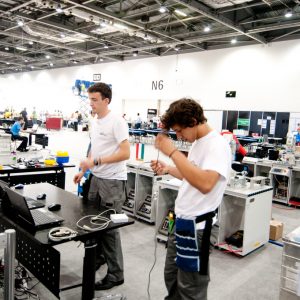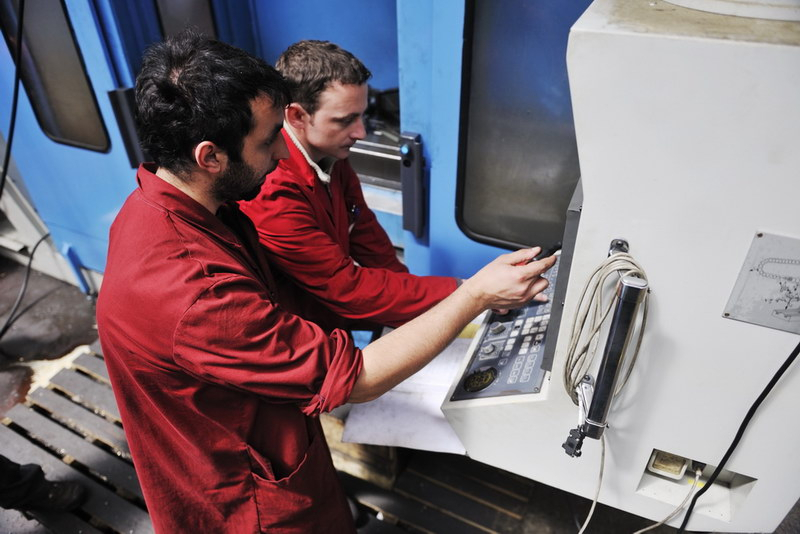
Mechatronics is now the central manufacturing sector for the transition to the new production methods driven by Industry 4.0. Large companies know this well, but also SMEs engaged in the search for a greater number of professionals related to the ongoing transformation of the production chain.
The point, however, is that these resources are often not found. Between now and 2023 Unioncamere estimates an employment requirement for companies in the “mechatronic-robotic” supply chain that varies between 83,000 and 96,000 units. The repair and maintenance sector will also express, in the same period, a request for important personnel: between 19,000and 23,000 positions. The electrical and electronic industries will also open the doors to 2-6 thousand new workers. Considering, however, the current levels of technical education, it is already known that many of these selections will find no results due to the absence of the right candidate (the estimate at national level is 33% – that is, one out of three). Why is that? The mechanical field is in second place among the most popular degrees. Yet, it is a paradox, the difficulty of finding graduates in the mechanical-mechatronic field is increasing: from 2017 to 2018 it has gone from 35% to 42%. And this make us think on how the next school year, 2019-2020, of all those enrolled in technical institutes in the technology sector, only 15% chose the mechanical/mechatronic path. In absolute numbers, we are talking about 17,000 students. Nothing compared to the employment needs expressed by the sector.
“The most requested figures from a 4.0 point of view”, says Federico Visentin, vice-president of Federmeccanica with responsibility for education, “are technicians for automation and mechatronic systems; technicians for the management and maintenance and use of industrial robots; industrial plant designers and operators for programming numerical control machines”. This shortcoming depends not only on an insufficient quantitative offer, but also on inadequate levels of preparation, due to deficiencies in the training system.
“We are doing our part – adds Visentin -. The national network of mechatronic technical institutes will soon take off. The aim is to exchange good practices in aligning the training needs of the supply chain and in updating curricula. In this sense, Federmeccanica is committed, through its participation in the European project NEW METRO, which involves 7 countries, to defining a mechatronic curriculum, in terms of training contents and teaching methods, for ITS (Technical Schools) validation at European level. More generally, there is a need to promote a culture that is favourable to business, which is lacking in Italy. On the contrary, it seems that we are going in the opposite direction”.
Why is that? The mechanical field is in second place among the most popular degrees. Yet, it is a paradox, the difficulty of finding graduates in the mechanical-mechatronic field is increasing: from 2017 to 2018 it has gone from 35% to 42%. And this make us think on how the next school year, 2019-2020, of all those enrolled in technical institutes in the technology sector, only 15% chose the mechanical/mechatronic path. In absolute numbers, we are talking about 17,000 students. Nothing compared to the employment needs expressed by the sector.
“The most requested figures from a 4.0 point of view”, says Federico Visentin, vice-president of Federmeccanica with responsibility for education, “are technicians for automation and mechatronic systems; technicians for the management and maintenance and use of industrial robots; industrial plant designers and operators for programming numerical control machines”. This shortcoming depends not only on an insufficient quantitative offer, but also on inadequate levels of preparation, due to deficiencies in the training system.
“We are doing our part – adds Visentin -. The national network of mechatronic technical institutes will soon take off. The aim is to exchange good practices in aligning the training needs of the supply chain and in updating curricula. In this sense, Federmeccanica is committed, through its participation in the European project NEW METRO, which involves 7 countries, to defining a mechatronic curriculum, in terms of training contents and teaching methods, for ITS (Technical Schools) validation at European level. More generally, there is a need to promote a culture that is favourable to business, which is lacking in Italy. On the contrary, it seems that we are going in the opposite direction”.
 Why is that? The mechanical field is in second place among the most popular degrees. Yet, it is a paradox, the difficulty of finding graduates in the mechanical-mechatronic field is increasing: from 2017 to 2018 it has gone from 35% to 42%. And this make us think on how the next school year, 2019-2020, of all those enrolled in technical institutes in the technology sector, only 15% chose the mechanical/mechatronic path. In absolute numbers, we are talking about 17,000 students. Nothing compared to the employment needs expressed by the sector.
“The most requested figures from a 4.0 point of view”, says Federico Visentin, vice-president of Federmeccanica with responsibility for education, “are technicians for automation and mechatronic systems; technicians for the management and maintenance and use of industrial robots; industrial plant designers and operators for programming numerical control machines”. This shortcoming depends not only on an insufficient quantitative offer, but also on inadequate levels of preparation, due to deficiencies in the training system.
“We are doing our part – adds Visentin -. The national network of mechatronic technical institutes will soon take off. The aim is to exchange good practices in aligning the training needs of the supply chain and in updating curricula. In this sense, Federmeccanica is committed, through its participation in the European project NEW METRO, which involves 7 countries, to defining a mechatronic curriculum, in terms of training contents and teaching methods, for ITS (Technical Schools) validation at European level. More generally, there is a need to promote a culture that is favourable to business, which is lacking in Italy. On the contrary, it seems that we are going in the opposite direction”.
Why is that? The mechanical field is in second place among the most popular degrees. Yet, it is a paradox, the difficulty of finding graduates in the mechanical-mechatronic field is increasing: from 2017 to 2018 it has gone from 35% to 42%. And this make us think on how the next school year, 2019-2020, of all those enrolled in technical institutes in the technology sector, only 15% chose the mechanical/mechatronic path. In absolute numbers, we are talking about 17,000 students. Nothing compared to the employment needs expressed by the sector.
“The most requested figures from a 4.0 point of view”, says Federico Visentin, vice-president of Federmeccanica with responsibility for education, “are technicians for automation and mechatronic systems; technicians for the management and maintenance and use of industrial robots; industrial plant designers and operators for programming numerical control machines”. This shortcoming depends not only on an insufficient quantitative offer, but also on inadequate levels of preparation, due to deficiencies in the training system.
“We are doing our part – adds Visentin -. The national network of mechatronic technical institutes will soon take off. The aim is to exchange good practices in aligning the training needs of the supply chain and in updating curricula. In this sense, Federmeccanica is committed, through its participation in the European project NEW METRO, which involves 7 countries, to defining a mechatronic curriculum, in terms of training contents and teaching methods, for ITS (Technical Schools) validation at European level. More generally, there is a need to promote a culture that is favourable to business, which is lacking in Italy. On the contrary, it seems that we are going in the opposite direction”.
In order to cope with this mismatch, many mechanical companies are finding other solutions and have close collaborations, especially with ITSs. A virtuous example is the “Cuccovillo” in Bari, which has been operating in the mechanical-mechatronics-domotics system sector since 2010. “We aim at dual paths – says the director of ITS Cuccovillo, Roberto Vingiani – We work with realities such as Bosch, Magneti Marelli, Natuzzi, Datalogic, Masmec, Maldarizzi, Ge Avio, Sanofi, Jindal Films, just to name a few companies. We train young people in specialist skills that start from production (CNC machine programmers, Team Leaders, Lean) and through automation (PLC, Robots, Sensors) reach the enabling technologies of Industry 4.0”.
“There is no doubt that there is a problem in schools with knowledge of the manufacturing industry and orientation – said Sabrina De Santis, who has been in charge of Education at Federmeccanica for over 20 years -. Teachers, already in middle school, must enthuse young people with the study of STEM subjects. This can make a difference: we need to drag the students and show them the “beauty” of subjects such as mathematics, technology and science”.
read more at Scuola24


Post Views: 339
